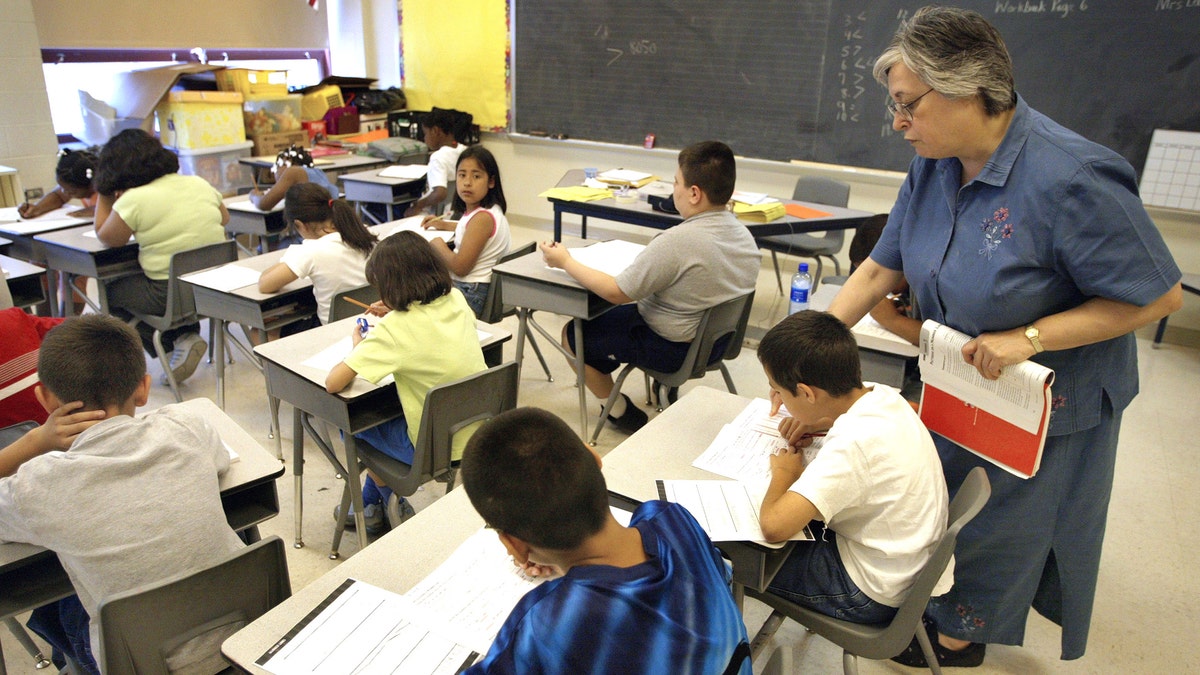
CHICAGO, IL - JULY 2: Teacher Arlene Lebowitz assists a student in her third-grade class during summer school July 2, 2003 in Chicago, Illinois. A record number of students are expected at summer school due to a strong showing for a new voluntary program for mid-tier students and strict application of non-ITBS (Iowa Tests of Basic Skills) test promotion standards. (Photo by Tim Boyle/Getty Images) (2003 Getty Images)
If the federal No Child Left Behind (NCLB) education law were successful, next year we would celebrate reaching its goals. Among those goals is closing achievement gaps between whites and English Language Learners (ELLs), including many Latinos. Sadly, large test-score gaps remain. Worse, Latino students, including ELLs, have been among those most harmed by the negative consequences of NCLB’s high-stakes tests.
Yet, instead of learning from NCLB’s failures, federal officials have pushed states to adopt new, “more rigorous” high-stakes tests to measure Common Core standards. These new exams will increase the harm to Latino and other students who can least afford it.
Pressure to boost scores to save schools from closure and other punishments has contributed to a national epidemic of cheating. Worst, high-stakes testing does not help schools improve.
The evidence of NCLB’s failure is clear. Gaps in student achievement were closing faster before the federal law than after. For example, the National Assessment of Educational Progress (NAEP), a highly respected national test given to samples of students, shows that the reading score gap between white and Latino 13-year-olds closed nine points (30 to 21) between 1975 and 1988, long before NCLB. Yet in 2012, ten years after NCLB became law, the gap was the same size it was in 1988. The NAEP reading gap for 17-year-olds closed nearly 20 points, from 41 to 22, between 1975 and 88. In 2012, it was just one point smaller.
NCLB’s high-stakes exams have damaged school quality by promoting narrow teaching to the test and crowding out time for important subjects like music, art, social studies and science. The tests leave out most of what parents, colleges and employers say they want kids to learn.
Testing overkill has turned many schools into stressful or even hostile environments and fostered student pushouts, feeding the “school to prison pipeline.” The harm has been most severe in schools serving low-income students, including many Latinos. Pressure to boost scores to save schools from closure and other punishments has contributed to a national epidemic of cheating. Worst, high-stakes testing does not help schools improve.
NCLB’s consequences have fueled a growing national rebellion against test overuse and misuse. Parents, students and teachers have boycotted tests, demonstrated, and won victories at state and local levels. In a recent national poll, parents rated testing as one of two primary school problems.
Now Secretary Duncan is pressuring states to adopt new Common Core State Standards and tests. Unfortunately, that will mean even more testing madness, not better assessments or improved schools. The exams will remain mostly multiple-choice and will bring more tests to more grades. Advocates for English language learners have raised concerns about a lack of testing accommodations, including native language materials. Without appropriate accommodations, ELL students will face even greater frustration and failure. That will likely lead to higher dropout rates and additional barriers to good jobs. States could even require students to pass these tests to graduate, causing more harm to Latinos.
New York and Kentucky students took these more rigorous Common Core tests in the spring. The results were devastating. Teachers described children in tears, faced with unfamiliar material. New York’s achievement gaps grew. Just 19 percent of Latino students passed math exams, compared with 50 percent of white students. In English, a mere 3 percent of non-native English speakers scored proficient.
Our children, classrooms and communities deserve better. High-stakes testing should be replaced with assessment alternatives that bring better educational results, like those used by the New York Performance Standards Consortium. The Consortium schools, which serve populations similar to other New York City public high schools, won waivers from most state-mandated tests. Instead, they use teacher-designed performance tasks. As a result, they have higher graduation rates and better college-going and completion rates than schools focused on preparing students for high-stakes standardized exams. These alternatives have clearly benefited Latinos and ELLs.
To allow for the creation of better assessment systems, there must be an indefinite moratorium on Common Core exams. The sooner we set a new direction for public school assessment, the sooner we can begin creating classrooms that foster the skills and qualities our students need to succeed.








































